-
 Bitcoin
Bitcoin $115000
0.12% -
 Ethereum
Ethereum $3701
4.50% -
 XRP
XRP $3.081
2.99% -
 Tether USDt
Tether USDt $0.0000
-0.01% -
 BNB
BNB $767.9
1.45% -
 Solana
Solana $169.5
3.13% -
 USDC
USDC $0.9999
0.01% -
 Dogecoin
Dogecoin $0.2106
4.30% -
 TRON
TRON $0.3334
1.62% -
 Cardano
Cardano $0.7564
2.54% -
 Stellar
Stellar $0.4165
0.76% -
 Hyperliquid
Hyperliquid $38.75
0.25% -
 Sui
Sui $3.593
3.00% -
 Chainlink
Chainlink $17.08
3.59% -
 Bitcoin Cash
Bitcoin Cash $573.6
4.35% -
 Hedera
Hedera $0.2508
-0.84% -
 Avalanche
Avalanche $23.07
6.46% -
 Ethena USDe
Ethena USDe $1.001
-0.02% -
 Litecoin
Litecoin $120.8
8.17% -
 UNUS SED LEO
UNUS SED LEO $8.943
-0.32% -
 Toncoin
Toncoin $3.400
-5.60% -
 Shiba Inu
Shiba Inu $0.00001255
1.54% -
 Uniswap
Uniswap $9.908
6.32% -
 Polkadot
Polkadot $3.718
2.10% -
 Monero
Monero $303.0
-0.74% -
 Dai
Dai $0.9999
-0.02% -
 Bitget Token
Bitget Token $4.392
0.91% -
 Cronos
Cronos $0.1403
6.31% -
 Pepe
Pepe $0.00001076
1.13% -
 Aave
Aave $267.2
1.80%
What is the difference between DEX and CEX? How to choose an exchange that suits you?
Decentralized exchanges (DEXs) let users trade directly via blockchain without intermediaries, while centralized exchanges (CEXs) act as traditional brokers managing transactions and user funds.
Jun 14, 2025 at 12:01 am
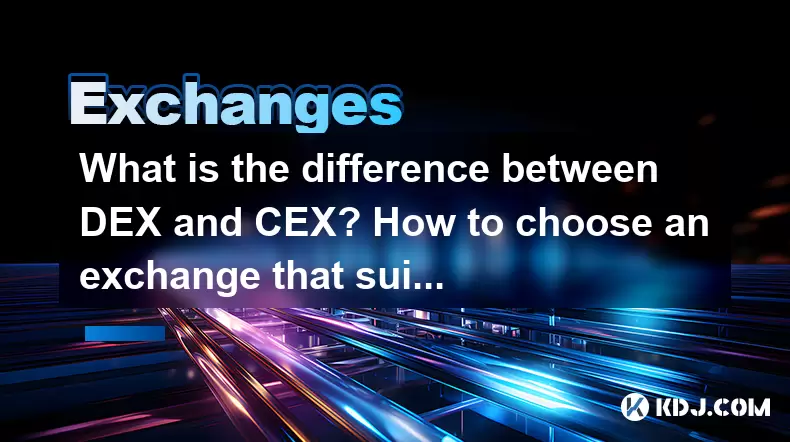
Understanding the Core Concepts: What Are DEX and CEX?
In the cryptocurrency ecosystem, decentralized exchanges (DEXs) and centralized exchanges (CEXs) are two major types of platforms for trading digital assets. A centralized exchange operates as a traditional brokerage system, where a central authority manages transactions, user funds, and order books. Users deposit their cryptocurrencies into the platform, which then facilitates trades on their behalf.
On the other hand, a decentralized exchange removes intermediaries from the process by leveraging blockchain technology to enable peer-to-peer transactions directly between users. These platforms operate through smart contracts, allowing users to trade without relinquishing control of their private keys or funds.
Key takeaway: The main difference lies in the level of control users have over their assets and the underlying structure of transaction processing.
Operational Mechanisms: How Do DEXs and CEXs Work?
Centralized exchanges function similarly to traditional stock exchanges. They maintain an internal ledger of user balances and execute trades based on bid-ask orders. When you place a buy or sell order on a CEX, the platform matches it with another user's order. All transactions occur off-chain, meaning they're not recorded directly on the blockchain unless deposits or withdrawals happen.
Decentralized exchanges, however, rely on automated market makers (AMMs) or order book models that run on-chain. AMM-based DEXs use liquidity pools where users can deposit tokens to provide liquidity in exchange for fees. Smart contracts facilitate all trades, ensuring transparency and eliminating counterparty risk.
- Liquidity Providers (LPs) contribute funds to pools and earn rewards
- Smart Contracts automatically execute trades and manage asset transfers
- On-chain Transactions ensure full transparency but may result in higher gas fees
User Experience: Interface and Accessibility Differences
Centralized exchanges typically offer more polished interfaces with advanced features like margin trading, stop-loss orders, and real-time analytics. These platforms invest heavily in user experience design, making them ideal for beginners and professional traders alike.
Decentralized exchanges, while improving rapidly, often present a steeper learning curve. Most DEXs require users to connect a wallet such as MetaMask or Trust Wallet before interacting with the platform. Additionally, the absence of customer support and limited functionality compared to CEXs can be a barrier for new users.
- TradingView-style Charts are common on CEXs but rare on DEXs
- Customer Support is available on most CEXs but virtually non-existent on DEXs
- Wallet Integration is mandatory for DEX usage
Security and Control: Who Holds Your Private Keys?
One of the most critical distinctions between DEXs and CEXs revolves around security and fund control. On centralized exchanges, users must trust the platform with their private keys and funds. This introduces counterparty risk, as seen in numerous high-profile exchange hacks and insolvencies.
Conversely, decentralized exchanges allow users to retain full control of their wallets and private keys at all times. Since no central server holds large reserves of digital assets, DEXs are less attractive targets for hackers. However, this also means users bear full responsibility for securing their own keys and recovery phrases.
- Private Key Management remains with the user on DEXs
- Hacking Risks are significantly lower on DEXs due to distributed architecture
- Recovery Options are limited on DEXs if access is lost
Fees and Transaction Costs: Which Platform Is More Cost-Effective?
Fee structures differ significantly between DEXs and CEXs. Centralized exchanges usually charge trading fees ranging from 0.1% to 0.5%, depending on the volume and user tier. Deposit and withdrawal fees vary by coin and network congestion.
Decentralized exchanges primarily charge swap fees, typically around 0.3% per trade, which are split among liquidity providers. However, users must also consider blockchain gas fees, which can fluctuate widely depending on network traffic, especially on Ethereum-based DEXs like Uniswap.
- Gas Fees on DEXs can spike during high demand periods
- Trading Fees on CEXs are predictable and often discounted for VIP users
- Withdrawal Costs depend on network conditions and token type
Choosing the Right Exchange: Factors to Consider
Selecting between a DEX and a CEX depends on individual priorities and experience levels. Beginners might prefer the ease of use and additional services offered by centralized platforms, including fiat on-ramps and mobile apps. Advanced users or those prioritizing privacy and control may lean toward decentralized alternatives.
Consider the following when choosing:
- Privacy Requirements: DEXs offer greater anonymity
- Trading Volume Needs: CEXs generally have deeper liquidity
- Asset Availability: Some tokens are exclusive to either DEXs or CEXs
- Risk Tolerance: DEXs reduce reliance on third parties
Frequently Asked Questions
Q: Can I lose money on a DEX due to slippage?
A: Yes, slippage occurs when there’s insufficient liquidity in a pool, causing the executed price to differ from the expected price. Users should set appropriate slippage tolerance levels before executing trades.
Q: Do CEXs offer insurance for hacked accounts?
A: Some centralized exchanges maintain insurance funds or cold storage reserves to protect users, but coverage varies. Always check the specific policies of the exchange.
Q: Is it possible to use both DEXs and CEXs together?
A: Absolutely. Many traders use CEXs for quick trades and fiat conversions, while utilizing DEXs for privacy-focused transactions or accessing niche tokens.
Q: Are there regulatory differences between DEXs and CEXs?
A: Yes. Centralized exchanges often face stricter regulations, including KYC requirements, whereas decentralized platforms operate in a legal gray area in many jurisdictions.
Disclaimer:info@kdj.com
The information provided is not trading advice. kdj.com does not assume any responsibility for any investments made based on the information provided in this article. Cryptocurrencies are highly volatile and it is highly recommended that you invest with caution after thorough research!
If you believe that the content used on this website infringes your copyright, please contact us immediately (info@kdj.com) and we will delete it promptly.
- Velo Universe, DEX, and DeFi Security: Navigating the Future of Decentralized Trading
- 2025-08-05 09:25:13
- Bitget Wallet Revolutionizes Solana with Gas-Free Transactions: A New Era for DeFi
- 2025-08-05 09:25:13
- Ozak AI, Crypto Boom, and ROI Potential: Is This the Next Big Thing?
- 2025-08-05 09:25:24
- Solana's ETF Hopes & the All-Time High Chase: Is SOL Set to Soar?
- 2025-08-05 09:25:24
- Coinbase's Brian Armstrong and the Art of Focused Work: A Deep Dive
- 2025-08-05 09:25:30
- Uniswap Price Prediction: Bullish Reversal on the Horizon?
- 2025-08-05 09:25:30
Related knowledge
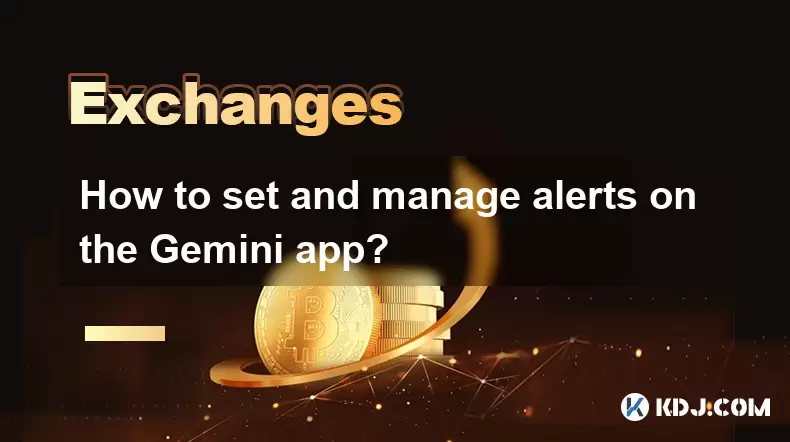
How to set and manage alerts on the Gemini app?
Aug 03,2025 at 11:00am
Understanding the Gemini App Alert SystemThe Gemini app offers users a powerful way to stay informed about their cryptocurrency holdings, price moveme...
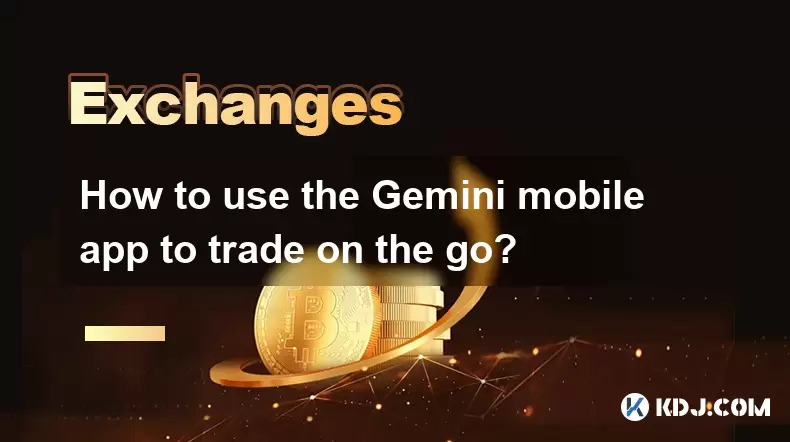
How to use the Gemini mobile app to trade on the go?
Aug 04,2025 at 09:14am
Setting Up the Gemini Mobile AppTo begin trading on the go using the Gemini mobile app, the first step is installing the application on your smartphon...
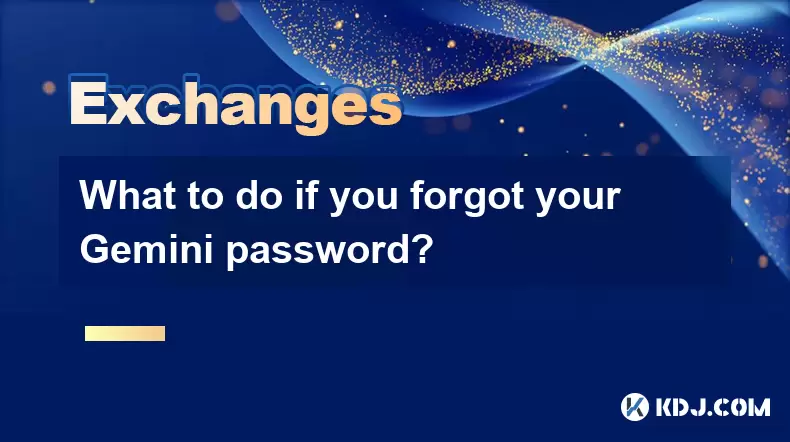
What to do if you forgot your Gemini password?
Aug 04,2025 at 03:42am
Understanding the Role of Passwords in Gemini AccountsWhen using Gemini, a regulated cryptocurrency exchange platform, your password serves as one of ...
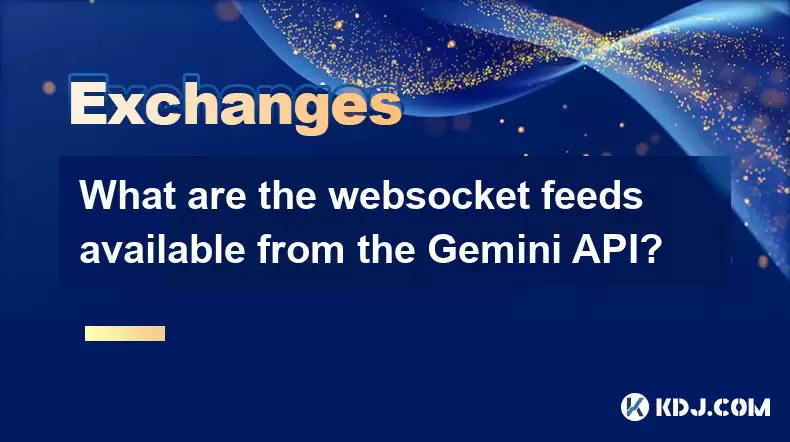
What are the websocket feeds available from the Gemini API?
Aug 03,2025 at 07:43pm
Overview of Gemini WebSocket FeedsThe Gemini API provides real-time market data through its WebSocket feeds, enabling developers and traders to receiv...
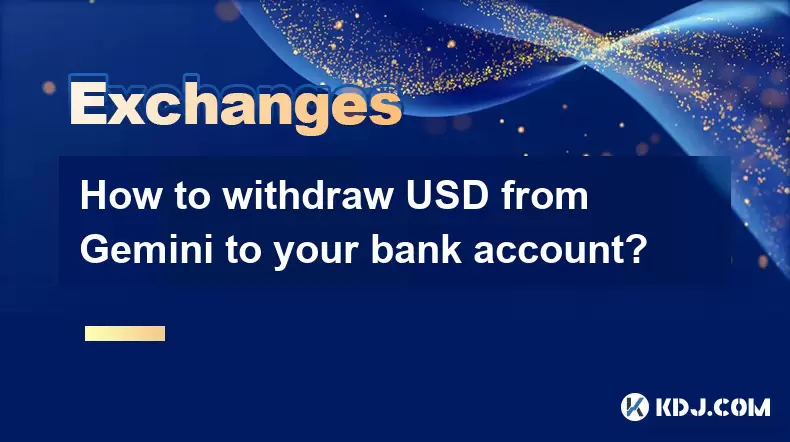
How to withdraw USD from Gemini to your bank account?
Aug 04,2025 at 11:01am
Understanding Gemini and USD WithdrawalsGemini is a regulated cryptocurrency exchange platform that allows users to buy, sell, trade, and store digita...
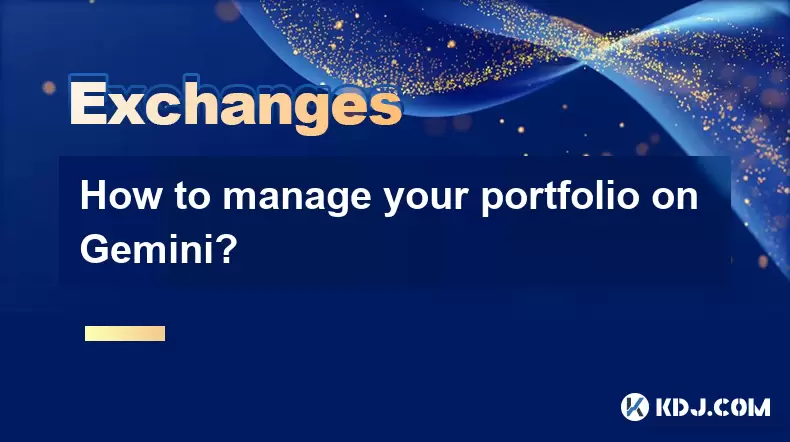
How to manage your portfolio on Gemini?
Aug 03,2025 at 10:36am
Accessing Your Gemini Portfolio DashboardTo begin managing your portfolio on Gemini, you must first log in to your account through the official websit...

How to set and manage alerts on the Gemini app?
Aug 03,2025 at 11:00am
Understanding the Gemini App Alert SystemThe Gemini app offers users a powerful way to stay informed about their cryptocurrency holdings, price moveme...

How to use the Gemini mobile app to trade on the go?
Aug 04,2025 at 09:14am
Setting Up the Gemini Mobile AppTo begin trading on the go using the Gemini mobile app, the first step is installing the application on your smartphon...

What to do if you forgot your Gemini password?
Aug 04,2025 at 03:42am
Understanding the Role of Passwords in Gemini AccountsWhen using Gemini, a regulated cryptocurrency exchange platform, your password serves as one of ...

What are the websocket feeds available from the Gemini API?
Aug 03,2025 at 07:43pm
Overview of Gemini WebSocket FeedsThe Gemini API provides real-time market data through its WebSocket feeds, enabling developers and traders to receiv...

How to withdraw USD from Gemini to your bank account?
Aug 04,2025 at 11:01am
Understanding Gemini and USD WithdrawalsGemini is a regulated cryptocurrency exchange platform that allows users to buy, sell, trade, and store digita...

How to manage your portfolio on Gemini?
Aug 03,2025 at 10:36am
Accessing Your Gemini Portfolio DashboardTo begin managing your portfolio on Gemini, you must first log in to your account through the official websit...
See all articles

























































































